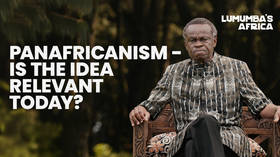Can the deep colonial differences over Africa’s great river be bridged?
Egypt could lose control over the Nile waters it has maintained for almost a century thanks to colonial-era treaties
This month, a long-expected agreement on the Nile has come into force, and the wealth of its waters will now be shared among many countries. Egypt, which heavily depends on the Nile, strongly opposes the agreement. However, the time of colonial-era treaties seems to have come to an end, so both upstream and downstream countries must work together to find a fair and equitable solution that is beneficial to everyone.
We Africans must understand how colonial-era treaties still fuel conflict over the Nile’s waters, favoring what was a Western-dominated agricultural production flow on the continent. We should fight for a Pan-African approach, embodied by the Nile Basin Cooperative Framework Agreement, to replace outdated entitlements with cooperative water management. By embracing shared stewardship, Egypt and Ethiopia can lead Africa in transforming the Nile from a source of discord into a lifeline that fosters unity and regional resilience.
In October 2024, the Nile Basin Cooperative Framework Agreement (CFA), or Entebbe Agreement, was finally ratified by six countries, bringing it into force. This watershed agreement, which includes Ethiopia, Uganda, Rwanda, Tanzania, Burundi, and South Sudan, could reshape how Africa’s longest river is shared.
However, Egypt and Sudan, two downstream nations heavily reliant on the Nile, have rejected the CFA, continuing to assert historical rights rooted in colonial-era treaties. These treaties reflect a damaging legacy of foreign interference, one that has stoked conflict and hampered development. As the effects of climate change intensify, Africa faces a pivotal choice: Remain divided by outdated entitlements or embrace Pan-African cooperation that redefines the Nile as a shared lifeline for everyone.
A colonial legacy of discord and inequity
At the heart of the Nile dispute is a set of colonial-era treaties that awarded the lion’s share of the Nile’s resources to Egypt and Sudan. Chief among these is the 1929 Anglo-Egyptian Treaty, negotiated by the British colonial authorities, which allocated nearly 48 billion cubic meters of the Nile’s annual flow to Egypt, with no input from other riparian nations. This arrangement was further cemented by the 1959 Nile Waters Agreement, which granted Egypt and Sudan 55.5 billion and 18.5 billion cubic meters of water, respectively, without consulting other Nile Basin countries. This left upstream nations, including Ethiopia – where 85% of the Nile’s water originates – without a say in the river’s management.
The harmful effects of these colonial-era agreements resonate to this day. As a result of this exclusionary framework, upstream countries have been unable to develop water infrastructure that could support their own growth. The Grand Ethiopian Renaissance Dam (GERD), for instance, has become a focal point of tension between Egypt and Ethiopia. Ethiopia views the GERD as essential for its development and energy needs, while Egypt perceives it as a threat to its water security. Egypt’s reliance on colonial-era water rights underscores how a legacy of external interference has driven a wedge between African nations, creating a zero-sum game over a resource that could otherwise foster regional unity.
The role of the Nile Basin initiative
Efforts to foster cooperative management of the Nile began with the Nile Basin Initiative (NBI) in 1999, which brought together the river’s 11 riparian states to promote sustainable development and equitable water sharing. The NBI aimed to address the deep-seated mistrust among Nile countries, setting the stage for negotiations that would eventually lead to the CFA. Although the CFA represents the most significant achievement of the NBI to date, its implementation has been stymied by Egypt’s refusal to abandon colonial-era treaties that enshrine its dominance over the Nile.
The recent CFA ratification by six countries signals a clear desire among Nile Basin nations to move beyond the constraints of the past. By emphasizing “equitable and reasonable utilization,” the CFA embodies a forward-thinking approach to resource sharing that is based on the principles of international law, particularly the 1997 UN Convention on the Law of Non-Navigational Uses of International Watercourses. As Ethiopian Prime Minister Abiy Ahmed stated, South Sudan’s ratification is a “historic moment” for the region, one that lays the foundation for a legal framework to govern Nile resources fairly and sustainably.
Gamal Abdel Nasser, Egypt’s Pan-Africanist leader in the 1950s-1960s, championed African unity in resource sharing, including water, through both diplomacy and radical politics. Revered across Africa, even in Ethiopia, he remains a symbol of liberation. Egypt could leverage Nasser’s legacy to foster cooperative ties with Nile Basin countries, transforming his enduring influence into a modern framework for equitable and sustainable water management.
The Pan-African imperative
Pan-Africanism – the idea that African nations should work together in the spirit of unity and mutual support – is essential for addressing the Nile’s complex challenges. Colonial powers drew borders, made treaties, and divided resources in ways that benefited their interests, often pitting African nations against one another. A Pan-African approach offers an alternative vision, one in which Africa’s longest river is managed as a shared resource that sustains all its people, regardless of political boundaries.
A pan-African solution to the Nile’s challenges would entail a cooperative governance model that treats the river as a common resource, much like the EU’s approach to managing cross-border rivers. Instead of viewing the Nile as a battleground for national interests, riparian countries could establish a Nile Basin Commission to oversee water allocation, promote joint infrastructure projects, and support environmental conservation efforts. This would create a platform for open dialogue, mitigating the risk of conflict and fostering trust among Nile nations.
Climate change and population growth
The urgency of a Pan-African approach is underscored by the looming threats of climate change and population growth. The Nile Basin is already feeling the effects of a warming climate. Rising temperatures are expected to increase evaporation rates and reduce water availability across the region. A study by the World Resources Institute estimates that water stress in the Nile Basin could increase by 60% by 2040, making cooperative water management even more crucial.
Additionally, the Nile Basin’s population is projected to grow from 257 million in 2020 to nearly 400 million by 2050. As the demand for food, water, and energy rises, the potential for resource-driven conflicts will only intensify. In the face of these challenges, a Pan-African approach to water sharing could help Nile countries avoid the pitfalls of unilateral action. By investing in joint infrastructure projects, such as shared irrigation systems and water conservation initiatives, Nile Basin nations could address their collective water needs while minimizing environmental degradation. Collaborative efforts to adapt agriculture to climate impacts, promote drought-resistant crops, and improve irrigation efficiency would not only bolster food security but also reduce the strain on the Nile.
Egypt’s position
While Egypt’s concerns about water security are valid, its reliance on colonial-era treaties to uphold its claims is increasingly untenable. According to the UN, over 90% of Egypt’s water needs are met by the Nile, making it one of the world’s most water-dependent nations. However, by rejecting the CFA and insisting on historical entitlements, Egypt risks isolating itself from the broader Pan-African movement toward self-determination and collective resource management.
For Egypt, embracing a Pan-African approach to the Nile could yield long-term benefits. Rather than viewing the CFA as a threat, Egypt could engage with other Nile Basin countries to ensure its water security through joint projects and technological innovation. For example, desalination plants and wastewater recycling programs could help diversify Egypt’s water sources, reducing its dependency on the Nile. Furthermore, by investing in shared infrastructure and conservation initiatives, Egypt could position itself as a leader in sustainable water management, aligning itself with the broader African agenda for climate resilience and environmental stewardship.
Moreover, Egypt can partner with Ethiopia and other Nile Basin countries to launch joint agricultural initiatives, such as shared irrigation projects that boost crop yields while conserving water. Additionally, Nile-based industrial and commercial developments, like cooperative fisheries, renewable energy plants, and river transport systems, could enhance regional economies and create sustainable employment opportunities. By investing in these collaborative projects, Egypt would not only secure its own water needs but also help build a Pan-African framework for resource-sharing, fostering stability and prosperity throughout the Nile Basin.
Toward a shared vision for the Nile
The path forward for the Nile Basin is clear: Africa must overcome the legacy of colonialism by forging a new framework for water sharing that prioritizes cooperation over conflict. This requires a willingness among Nile countries to make concessions, to compromise, and to recognize their mutual dependence on this vital resource. The CFA’s principles of equitable use and environmental sustainability provide a foundation upon which to build a shared future, but the hard work of translating these principles into action remains. A Nile Basin Commission, as proposed under the CFA, could serve as a vehicle for achieving this vision.
By establishing binding agreements on water allocation, monitoring the environmental impacts of major projects, and facilitating knowledge exchange, the commission could promote a holistic approach to water management that respects the needs of all riparian states. Additionally, the commission could play a key role in attracting international funding for sustainable development initiatives, such as renewable energy projects and conservation programs, that benefit the entire basin.
The Pan-African solution
The Nile River, like Africa itself, is bound by a complex history of foreign interference and internal division. But it also embodies the potential for unity, for shared prosperity, and for a future in which African nations work together to harness their resources responsibly. As recent ratifications of the CFA show, many Nile Basin countries are ready to embrace a new approach to water sharing, one that looks beyond colonial legacies and focuses on regional solidarity. In the spirit of Pan-Africanism, Nile Basin countries must continue to advocate for an inclusive, equitable, and sustainable framework for managing their shared waters. By doing so, they can ensure that the Nile remains a source of life, not a source of conflict. Africa’s longest river has the potential to be a unifying force, one that brings nations together in the pursuit of a common good. It is up to Africa’s leaders to seize this opportunity and demonstrate to the world that the continent’s future lies not in division, but in unity.
The statements, views and opinions expressed in this column are solely those of the author and do not necessarily represent those of RT.









Comments are closed.